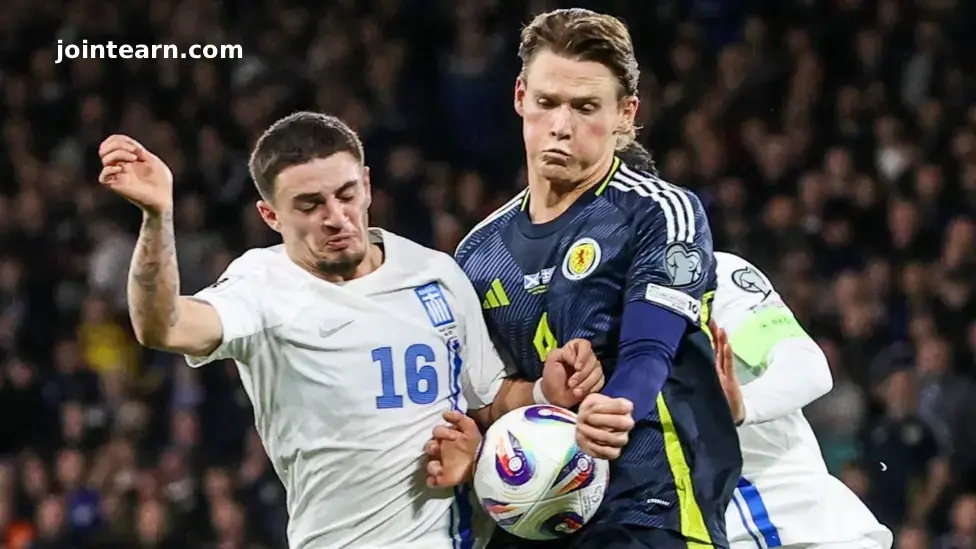
Scotland’s assistant coach Steven Naismith says the upcoming clashes against Greece and Denmark will be the defining moments of their 2026 World Cup qualifying campaign, describing them as the “play-off before the play-offs.”
Steve Clarke’s side travel to the Karaiskakis Stadium in Piraeus to face Greece on Saturday, 15 November, before wrapping up their group fixtures at home against Denmark at Hampden Park next Tuesday.
With both sides level on points at the top of their qualifying group — and only goal difference separating them — Scotland’s route to their first FIFA World Cup finals since 1998 remains within touching distance.
Scotland’s Route to World Cup Qualification
In this qualifying format, group winners secure automatic qualification for the 2026 World Cup in Canada, the United States, and Mexico, while runners-up enter the play-offs.
With Greece and Belarus already out of contention, the race for top spot is now a two-way shootout between Scotland and Denmark.
“Effectively we’re in a play-off to get to a World Cup,” said Naismith. “Get something from the first game, go into the second game, and if you can do what you can, then you’re at the World Cup. It’s effectively a play-off before the play-offs.”
The Scots will be looking to build on their impressive 3–1 victory over Greece in Glasgow last month, a result that kept their qualification hopes alive.
Naismith: Scotland Have Learned What It Takes to Win
Reflecting on the progress made under manager Steve Clarke, Naismith highlighted how recent successes — including qualification for Euro 2020 and Euro 2024 — have transformed the mindset within the national squad.
“The biggest thing I’ve noticed is that there’s a real understanding of what it takes to be successful,” Naismith said.
“Making the two Euros has been so valuable to this squad. There’s now a focus and understanding that, ‘we need to do this to get to a major tournament’.
“We’ve got a group of players who’ve been really successful — four campaigns where we’ve made the play-offs, reached two Euros, and now have a real chance to make the World Cup.”
For Naismith, the sense of national pride and unity is what drives this generation forward.
“Football is what the country lives and breathes. When we are united — fans, players, and manager — we’ve been successful,” he said.
“I grew up watching the last World Cup in France ‘98. Now there’s a generation of Scots who’ve seen two major tournaments and could soon see a World Cup. That’s massive.”
Tough Test Awaits in Greece
Scotland’s most recent meeting with Greece in the Nations League play-offs ended in defeat over two legs — a reminder that this weekend’s encounter will be anything but easy.
“All the games have been tight affairs,” Naismith admitted. “Greece, Denmark, and ourselves all came into this group thinking we could win it.
“Greece have felt hard done by in some performances, so we know it’ll be a tough game. We’ve played them enough recently to know what we need to do — and what not to do — to avoid giving them good spells.”
The Scots will look to maintain their momentum after an impressive run that has included victories over Spain, Norway, and Georgia in recent qualifying cycles.
Injury Concerns: Billy Gilmour Still in Doubt for Greece, Hopeful for Denmark
Scotland have been hit by a few injury setbacks, with Billy Gilmour, Lewis Miller, and Ross McCrorie among those facing fitness battles.
Midfielder Billy Gilmour, 24, has been ruled out of the Greece clash due to a groin injury, but Naismith remains hopeful the Napoli star could return in time to face Denmark.
“Billy’s picked up an injury a couple of weeks back,” Naismith explained. “There was an argument to have him in camp, but it’s better he stays at home to recover. There’s still a good, realistic chance he’ll be fit for next week.
“It’s higher risk if you force him into the first game when he’s not 100 percent. Give him the week, and he could be ready to go at a really good level.”
If fit, Gilmour’s composure and control in midfield could be pivotal in the decisive Hampden showdown.
Scotland Chasing History
Scotland haven’t appeared at a men’s World Cup finals since France 1998, but under Steve Clarke, belief is surging once more.
The Tartan Army — who have followed their team through years of near misses — are daring to dream again.
“What an opportunity this group has to make massive history,” Naismith said. “We’ve been to two Euros and maybe didn’t do ourselves justice, but to reach a World Cup would be another level.”
As the team prepares for two defining fixtures, Scotland’s fate rests in their own hands. A strong performance in Greece and a win against Denmark could finally seal their long-awaited return to the world’s biggest football stage.


Leave a Reply